|
|
|
Sort Order |
|
|
|
Items / Page
|
|
|
|
|
|
|
| Srl | Item |
| 1 |
ID:
147199
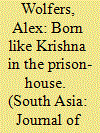

|
|
|
|
|
| Summary/Abstract |
The revolutionary thinker and later yogi of Pondicherry, Aurobindo Ghose (1872–1950), played a critical role during the Swadeshi movement in Bengal, articulating a radical vision that determined the limits and possibilities of the Indian political. Reading his polemical journalism in Bande Mataram alongside his prison memoir, Karakahini, reveals the importance of the jail for his staging of politics. This paper refutes the usual dichotomy of politics and spirituality in readings of Aurobindo and instead explores their underlying interconnectedness in relation to his scripting of an insurrectionary and universalist Hindu metaphysics in which divinity intervened in human history on the side of the oppressed. Aurobindo's central symbol—of Krishna being born in a prison cell—inscribed enduring theo-political significance into the colonial jail, which was successfully re-imagined as a revolutionary ashram, a transformative and sovereign space where political prisoners could be reborn.
|
|
|
|
|
|
|
|
|
|
|
|
|
|
|
|
| 2 |
ID:
145995
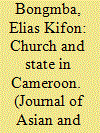

|
|
|
|
|
| Summary/Abstract |
In this essay, I discuss church state relations in Cameroon through a hermeneutics of the political theology of Christian Cardinal Tumi. I begin with a brief introduction to set the scene and follow it with a discussion of two major works by Cardinal Tumi. In the first book Tumi provides a detailed analysis of his relationship with the political leaders of Cameroon, and in the second book, he articulates his political theology. I conclude by arguing that one way forward for a political theology in Cameroon is to embrace a broad perspective that is not restricted to one’s personal faith in Jesus Christ.
|
|
|
|
|
|
|
|
|
|
|
|
|
|
|
|
| 3 |
ID:
174374
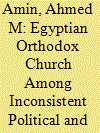

|
|
|
|
|
| Summary/Abstract |
Beginning with the uprising in 2011 and until the reelection of President Abdel Fattah El-Sisi in 2018 for a second term, the Egyptian Orthodox Church has been an important player as the representative of the Coptic Christians in the country. This article examines the role of the Egyptian Orthodox Church since the establishment of the republic in 1952 and explores the historical events that sought to redefine the role of the Church in the political sphere. Unlike the previous studies focusing on Coptic Christians and their position in the sociopolitical contexts, this study tackles the political role of the Orthodox Church in its institutional capacity. The study concludes that the Egyptian Orthodox Church has turned into an important political player in the political sphere, and its political role increased substantially with the uprising. Its power is manifested in its support for the political transformations in 2013 and the backing the regime until today.
|
|
|
|
|
|
|
|
|
|
|
|
|
|
|
|
| 4 |
ID:
134822
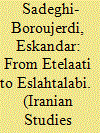

|
|
|
|
|
| Summary/Abstract |
This article examines the importance of the political thought and praxis of politico, ‘reformist’ strategist and intellectual, Saʿid Hajjarian, and his rethinking of the post-revolutionary Iranian state’s sources and bases of legitimacy in the 1990s and 2000s. It also provides an exposition and assessment of a number of his recommendations for the realisation of ‘political development’ (towseʿeh-ye siyāsi) in the post-revolutionary order and their contribution to the discourse of eslāhāt during the presidency of Hojjat al-Islam Mohammad Khatami (1997–2005). Moreover, it attempts to situate Hajjarian within a broader spectrum of reformist political opinion and its proponents within the Islamic Republic of Iran’s political class.
|
|
|
|
|
|
|
|
|
|
|
|
|
|
|
|
| 5 |
ID:
172342
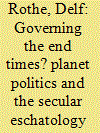

|
|
|
|
|
| Summary/Abstract |
This article furthers the debate on the political implications of the Anthropocene – the most recent geological epoch marked by catastrophic environmental change – by engaging it through the lens of political theology. The article starts from the observation that discourses on the Anthropocene and related political projects are deeply influenced by a linear temporality and a common orientation towards the threat of the end of time. It distinguishes three competing discourses of the Anthropocene, eco-catastrophism, eco-modernism and planetary realism. The article analyses how these discourses invoke and update key symbols, images, and storylines of Christian political theology. Furthermore, it studies how each discourse mobilises these secularised Christian motifs to promote competing planet political projects. Each of these projects develops a different position towards the unfolding planetary crisis and the related threat of the end of time. Eco-catastrophism calls for a planetary emergency management, eco-modernism promotes ongoing experimentation with the planet, whereas planetary realism translates into what could be called a ‘realpolitik of resilience’. Revealing the Western theological roots of the Anthropocene and planet politics is essential if the emerging literature on the Anthropocene wants to live up to its promise of pluralising and decolonising IR.
|
|
|
|
|
|
|
|
|
|
|
|
|
|
|
|
| 6 |
ID:
093957
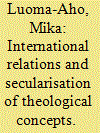

|
|
|
| 7 |
ID:
157099
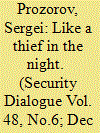

|
|
|
|
|
| Summary/Abstract |
The article addresses the reinterpretation of the problematic of security in the messianic turn in contemporary continental political thought. I focus on Giorgio Agamben’s reinterpretation of Hobbes’s Leviathan in Stasis, which restores an eschatological dimension to this foundational text of modern security politics. Hobbes’s commonwealth has been traditionally read as a secularized version of the katechon, a force that restrains the state of nature while drawing on its resources. Instead, Agamben argues that for Hobbes, the state is neither the analogue of God’s kingdom on earth nor the katechon that delays its arrival, but the profane power that will disappear when the kingdom of God is established on earth. It is thus in principle incapable of attaining the peace and security that it claims to provide, perpetually producing insecurity and violence in the guise of protection. In Agamben’s reading, it is precisely this failure of the state’s security apparatuses that assists the advent of the messianic event in an oblique fashion. The exposure of this failure does not aspire to the improvement of the apparatuses of security or resign us to inescapable insecurity but only affirms the need to render the present apparatuses inoperative, bringing forth a future without them.
|
|
|
|
|
|
|
|
|
|
|
|
|
|
|
|
| 8 |
ID:
158937
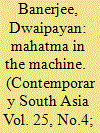

|
|
|
|
|
| Summary/Abstract |
Comment on Skaria, Ajay. 2016. Unconditional Equality: Gandhi's Religion of Resistance. Minneapolis: University of Minnesota Press.
|
|
|
|
|
|
|
|
|
|
|
|
|
|
|
|
| 9 |
ID:
153917
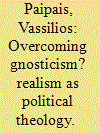

|
|
|
|
|
| Summary/Abstract |
This paper takes issue with approaches that relate realist political theology exclusively back to its Schmittian and neo-orthodox roots. While not entirely denying those influences, it argues that realist thought is more accurately described as rooted in the tensions characterizing Augustine's anti-heretic diatribes rather than taking inspiration from Schmittian political theology or the ‘Gnostic’ tendencies in Protestant neo-orthodox theology. Augustine's refutation of both the Manichaean Gnostic and the Pelagian solutions to the problem of evil gave rise to a complex understanding of the relationship between human free will and original sin based on a combination of ontological monism and ethical dualism. Building on this heritage, realists can be read as rehearsing Augustine's ambiguous gesture of overcoming Gnosticism with equally uncertain success. In responding to the modern ‘Gnostic’ challenge in terms that recognized the dialectical tension between ontological monism and ethical dualism, realists such as Morgenthau and Niebuhr should rather be seen as direct heirs of Augustine's ambivalent orthodoxy rather than Schmitt's unorthodox, semi-‘Gnostic’ Catholicism. This intellectual legacy may, then, explain their abhorrence of purist positions in politics—be they quietism, pacifism or, their opposite, political messianism—and adherence to an anti-‘Gnostic’ pragmatism grounded in the tensions of Augustinian theology.
|
|
|
|
|
|
|
|
|
|
|
|
|
|
|
|
| 10 |
ID:
075951
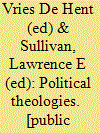

|
|
|
|
|
| Publication |
New York, Fordham University Press, 2006.
|
| Description |
xi, 796p.
|
| Standard Number |
0823226441
|
|
|
|
|
|
|
|
|
|
|
|
Copies: C:1/I:0,R:0,Q:0
Circulation
| Accession# | Call# | Current Location | Status | Policy | Location |
| 052165 | 201.72/VRI 052165 | Main | On Shelf | General | |
|
|
|
|
| 11 |
ID:
090728
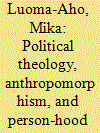

|
|
|
|
|
| Publication |
2009.
|
| Summary/Abstract |
In this article I identify international relations as a form of religion. My identification takes two epistemological paths. The first one has been cleared by political theologians such as Carl Schmitt, who teach that "secular" political ideas not only have a divine origin, but also structural identity with Christian theology. I will clear the second path with help from a cognitive theory of religion that identifies anthropomorphism as a defining criterion of religion. International relations is a religion, because it is a system of thought that takes the metaphorical image of the personified, embodied state more seriously than other, more idiosyncratic forms of anthropomorphism. What we have in academic IR is, thus, a theology that works to generalize and systematize this religious image into a disciplinary form.
|
|
|
|
|
|
|
|
|
|
|
|
|
|
|
|
| 12 |
ID:
093958
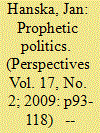

|
|
|
| 13 |
ID:
172289
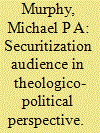

|
|
|
|
|
| Summary/Abstract |
Over the past two decades, securitization theory has developed into a robust literature of cases and critiques. The vast majority of the attention paid to securitization has been to the securitizing actor and the referent object, leaving the audience – the body that determines the fate of a securitizing move by accepting or rejecting the securitizing actor’s request – undertheorized. The audience is presented as a problematic contradiction, because as a collectivity called by the securitizing actor it appears to be a passive body, critiqued thereby as potentially irrelevant. On the other hand, both the original Copenhagen school formulation of securitization theory and many of its current theorists reaffirm the agency of the audience to actively determine the success or failure of the securitizing move. This article turns to political theology for guidance, and explains the contradiction of the passive/active audience through homology to the ekklesia and the acclamation of ‘amen’ in liturgical doxology. The fact that the congregation is passive recipient of a call does not negate the essential and substantial role that it must actively play, just as the contradiction of the passive/active description of the securitization audience is not a problem of illogic, but a paraconsistent truth.
|
|
|
|
|
|
|
|
|
|
|
|
|
|
|
|
| 14 |
ID:
186152
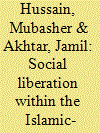

|
|
|
|
|
| Summary/Abstract |
This article presents a detailed study of the Ahl-i-Hadith movement in Pakistan and shows how its scholars continue to rely heavily on religious discourses and texts produced by official Saudi Salafi scholars. The authors illustrates this by showing how Pakistani Ahl-i-Hadith scholars actively refer to the fatwas issued by Saudi scholars. Further, based on interviews with both senior and younger scholars, they show that most of them, while somewhat troubled by the changes occurring within Saudi Arabia, are inclined to follow whatever direction the Saudi religious establishment adopts. Thus, in the view of the authors, social liberation within Saudi Arabia will trigger similar changes in attitude within this movement. The article, however, also highlights the need to recognize that the Ahl-i-Hadith movement represents a very small, though influential, group within the broader Pakistani religious sphere, which is dominated by Deobandi and Barelvi networks. Thus, it should not be assumed that the existence of Salafi groups in a country means that Salafism constitutes the dominant Islamic force in that context.
|
|
|
|
|
|
|
|
|
|
|
|
|
|
|
|
| 15 |
ID:
184151
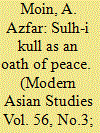

|
|
|
|
|
| Summary/Abstract |
Sulh-i kull or ‘Total Peace’ with all religions was a policy introduced by the Mughal empire in South Asia in the late sixteenth century. It was a radically accommodative stance for its day, especially when compared to the intolerant manner in which other Muslim and Christian polities of the early modern world dealt with religious difference. This article introduces a new perspective on Mughal Total Peace by arguing that it was meant to solve a long-standing problem created by the monotheistic ban on oaths sworn on non-biblical deities. Such a ban restricted the ability of Muslim kings to solemnize peace treaties with their non-monotheist rivals and subjects. In the second half of the article, I examine two pre-Mughal cases, from the eleventh century (Mahmud of Ghazna) and the seventh century (the prophet Muhammad), respectively, to explore what other, less ‘total’, mechanisms were invented to suspend this ban and enable oath-taking and solemn peace-making between monotheist and non-monotheist. In effect, I use the Mughal case to highlight a specific issue that shaped political theology in Islam over the long term.
|
|
|
|
|
|
|
|
|
|
|
|
|
|
|
|
| 16 |
ID:
174474
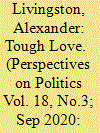

|
|
|
|
|
| Summary/Abstract |
Love is a key concept in the theory and history of civil disobedience yet it has been purposefully neglected in recent debates in political theory. Through an examination of Martin Luther King, Jr.’s paradoxical notion of “aggressive love,” I offer a critical interpretation of love as a key concept in a vernacular black political theology, and the consequences of love’s displacement by law in liberal theories of civil disobedience. The first section locates the origins of aggressive love in an earlier generation of black theologians who looked to India’s anticolonial struggle to reimagine the dignity of the oppressed as “creative survival.” The second contextualizes King’s early sermons on moral injury and self-respect within this tradition to reinterpret Stride toward Freedom’s account of the dignity-enhancing effects of nonviolent resistance as the triumph of love over fear. The third considers the implications of these arguments for conceptualizing the moral psychology of the white citizen and its consequences for contemporary debates over the ideological uses of Civil Rights history. The call to respond to oppression with aggressive love illustrates the paradoxical character of civil disobedience obscured by legal accounts as well as by criticisms of the very idea of “civil” disobedience. This is the paradox of affirming civility while enacting disobedience in order to bind political confrontation with political pedagogy.
|
|
|
|
|
|
|
|
|
|
|
|
|
|
|
|
|
|
|
|
|